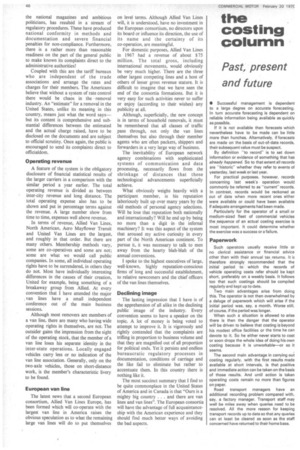the costing column
Page 48

If you've noticed an error in this article please click here to report it so we can fix it.
Past, present and future
• Successful management is dependent to a large degree on accurate forecasting. In turn accurate forecasting is dependent on reliable information being available as quickly as possible.
If it is not available then forecasts which nevertheless have to be made can be little more than hunches. Alternatively, if forecasts are made on the basis of out-of-date records, their subsequent value must be suspect.
By definition "to record" is to set down information or evidence of something that has already happened. So to that extent all records are "historic" whether they refer to events al yesterday, last week or last year.
For practical purposes, however, records concerning last week's operation would commonly be referred to as "current" records. In contrast, records would be reckoned as out of date when more recent ones either were available or could have been available if adequate arrangements had been made.
Particularly for the operator of a small or medium-sized fleet of commercial vehicles the sequence of an actual costing exercise is most important. It could determine whether the exercise was a success or a failure.
Paperwork
Such operators usually receive little or no clerical assistance or financial advice other than with their annual tax returns. It is therefore strongly recommended that the initial period to which the records of vehicle operating costs refer should be kept short, preferably on a weekly basis. It follows too that such costings should be compiled regularly and kept up to date.
Two main advantages arise from doing this. The operator is not then overwhelmed by a deluge of paperwork which will arise if the initial period was, say, a month. Worse still, of course, if the period was longer.
When such a situation is allowed to arise there is then the danger that the operator will be driven to believe that costing is beyond his modest office facilities or the time he can devote to it. So he either never starts to cost or soon drops the whole idea of doing his own costing because it is unworkable—or so it seems.
The second main advantage in carrying out costing regularly, with the first results made available at short intervals, is that positive and immediate action can be taken on the basis of those results. And until action is taken operating costs remain no more than figures on paper.
Road transport managers have an additional recording problem compared with, say, a factory manager. Transport staff may well be miles away when queries need to be resolved. All the more reason for keeping transport records up to date so that any queries can at least be cleared as soon as the staff concerned have returned to their home base.














































































































































































































